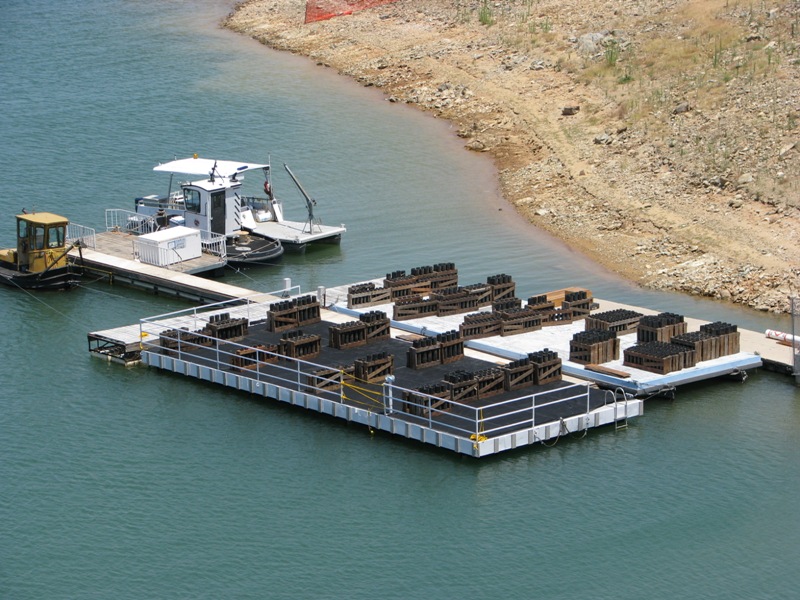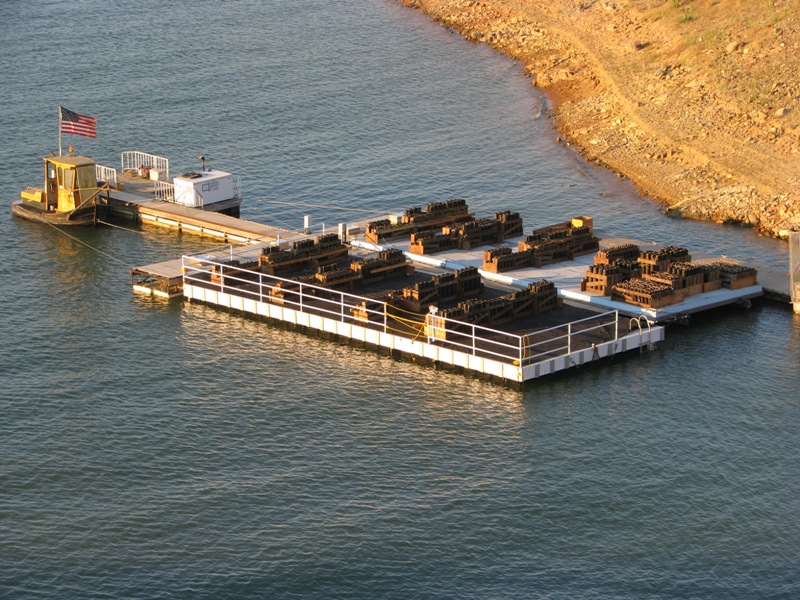 Welding
blankets, by traditional definition, are a step above fire retardant
or fire resistant tarpaulins. FR tarpaulins generally are required
to pass NFPA 701 burn test to qualify with the fire marshal for
an FR rating. This does not mean that these tarps do not burn,
it simply means they will self extinguish once the source of the
flame is removed. Welding blankets, on the other hand, are designed
to handle much higher temperatures for prolonged periods. Also,
welding blankets, commonly referred to as “fire proof blankets” do
not burn, they melt. Welding
blankets, by traditional definition, are a step above fire retardant
or fire resistant tarpaulins. FR tarpaulins generally are required
to pass NFPA 701 burn test to qualify with the fire marshal for
an FR rating. This does not mean that these tarps do not burn,
it simply means they will self extinguish once the source of the
flame is removed. Welding blankets, on the other hand, are designed
to handle much higher temperatures for prolonged periods. Also,
welding blankets, commonly referred to as “fire proof blankets” do
not burn, they melt.
Welding blankets carry ratings in degrees Fahrenheit for constant,
intermittent and melt. Typically these values will range from 300
degrees constant all the way up to 2500 degrees intermittent with
3000 degree melt. The “constant” rating
is intended to define the maximum temperature an object may be
at and be in direct contact with the blanket. The “intermittent” rating
(also referred to as excursion temp) is what the fabric can take
for short exposures without damaging the cloth. The “melting” temperature
is the point of no return where the fabric is physically damaged
due to prolonged exposure to excessive heat. In many cases, a lighter
weight and less expensive blanket can be used effectively with
proper site controls regarding the fabric’s exposure to direct
contact w/ slag, torch cut debris & splatter. The fabric style,
construction, weight, coating and thickness will vary as these
temperature ranges change.
WeldShield welding blankets are fabricated with high-temp thread
and brass grommets every 2’; they are then individually poly
bagged for ease in shipping, storage and handling. All stock sized
blankets will run smaller in their finished dimensions by several
inches due to the fabric lost in the hemming and seaming operations.
Finished sized blankets may be ordered at an upcharge if final
dimensions are critical.
The three predominant base fabrics are fiberglass, silica and
Aramid in ascending order of cost. The fiberglass families of welding
blankets are available as uncoated base fabrics (most economical)
as well as with a number of different coatings including silicone,
neoprene, Hypalon, aluminum, and Vermiculite. The uncoated fiberglass
blankets come in two different weights: 18 oz/sy (WeldShield 1890
F-W) and 24 oz/sy (WeldShield 2490 F-W). There is also a 1-side Aluminum coated fiberglass (WeldShield FA-S) that is ideal for heat reflection and direct heat contact.The silicone coated fiberglass
is generally used a as curtain for protection against molten metal
splash and is good to 500 degrees Fahrenheit (WeldShield 1790 SF-G or 1790 SF-R).
The salmon colored Neoprene coated fiberglass in the 17 oz/sy fabric
is ideal for use as a grinding shield to contain sparks and splatter
with a service temperature to 300 degrees Fahrenheit and a 1000
degree melting temperature and is easy to handle without the scatchiness
associated with raw fiberglass (WeldShield 1790 NF-P). The green
colored Hypalon coated fiberglass comes in an 18 oz/sy coated fabric
weight and is best deployed around oil & grease environments
and displays exceptional strength, abrasion & puncture resistance,
and low smoke (WeldShield 1890 HF-G). The gold toned Vermiculite coated fiberglass is available in both a 20 oz/sy (WeldShield 2090 VF-G) and a 40 oz/sy (WeldShield 4090 VF-G) and both are more expensive than the rest of the coated fiberglass products but ideal for high temp applications in small confined spaces where
other flammables are nearby. A good example of this would be welding
or soldering near wood framing.
The Silica cloth Welding Blankets are a mid-priced option with
the highest ratings for service, intermittent and melt temperatures.
These tan colored fabrics are soft and pliable with a good “hand” and
conform easily to any covered object. They can handle constant
temperatures to 1800 degrees F, excursions to 2500 degrees and
won’t melt until 3000 degrees. They come in two different
fabric weights: 18 oz/sy (WeldShield 1890 S-T) and 36 oz/sy (WeldShield
3690 S-T). These blankets are the professional’s choice for
severe welding applications involving extremes in heat, slag, welding
sparks and molten metal splash.
The Aramid product is available in only one style as a 23 oz/sy
black fabric known as Altex 400. The Aramid blend material is a
man made fiber typically containing exotic fibers like Kevlar and
it has a service temperature to 650 degrees Fahrenheit and displays
excellent strength and abrasion resistance. It is considered more
durable than standard fiberglass products and is also very flexible
with little stretching, offers good chemical and mildew resistance,
and is un-affected by most acids and alkali solutions. This is
a special order product that requires added leadtime to fulfill
most orders.
No matter what your choice, WeldShield Welding Blankets are an
excellent value and will give many years of use when used properly.
Feel free to contact us with any questions at info@welding-blankets.com.
In only 3 1/2 minutes, the heat from a house fire can reach over 1100 degrees Fahrenheit. (Fact Sheets about Injuries and Injury Prevention)
In a home fire, the peak temperature and duration of the fire can vary depending upon the size of the home, the materials used to construct the home, the response time of firefighters, etc. It is estimated that the typical peak temperature in a home fire ranges between 800 to 1200 degrees Fahrenheit. The typical time for firefighting authorities to bring a home fire into containment is estimated at 15 to 30 minutes.
Paper chars at approximately 402°F. To protect paper documents, the internal temperature of a safe must remain below 350°F while exposed to the conditions of the typical home fire. Thus at a minimum, a safe should provide enough fire resistance to keep the maximum internal temperature of the safe below 350°F, when exposed to external temperatures of 1200° for 30 minutes. (Liberty Safe & Security Products, Inc)
WeldShield 1790 SF-G & SF-R have a silicone coating that melts (burns) at 500 deg.
WeldShield 1890 F-W, 2490 F-W, 2490 AF-G & 2190 AF-B melts (burns) at 1000 deg.
WeldShield 1890 S-T & 3690 S-T silica blankets can handle the temp but will not protect documents inside.
WeldSheild Fiberglass Sewing Thread Specifications
 |
 |
| Fire Proof WeldShield 2190 AF-B used to protect platform during fireworks |
Frequently Asked Questions
We have a requirement to put fire blankets around
some semi-tires in our application. Our question is around how
well does the material stand up to extended exposure to sunlight,
water and freeze thaw cycles etc. Is it better to get a coated
blanket for the environmental concern? Also after some fire exposure
testing we may be requesting custom fit blankets for the longer
application. Is that something you can do?
I would go with a coated fabric, either black WeldShield 2190
AF-B or gold WeldShield 2490 AF-G (see column choices 5 & 6
from left side of the table above) can be custom sized by clicking
on "custom tarp configurator" link in paragraph above
the table of stock sizes. An uncoated fiberglass or silica product
could wick moisture and cause early breakdown of the fibers.
Sunlight is no factor. As long as you are not talking cryogenic
like temperatures, the cold should not have an effect on the
blankets once they return to a reasonable temperature. They will
get brittle at very low temperatures, below 32 degrees F, but
would retain their resistance to slag, sparks, etc.
I'm looking for a welding screen, would these work for this application?
No, we would recommend you take a look at our other site dedicated to Welding Screens.
|